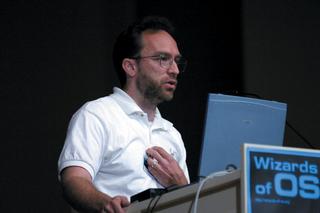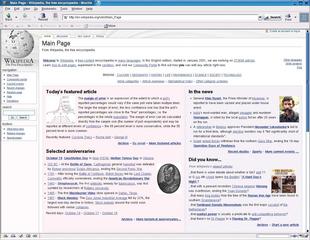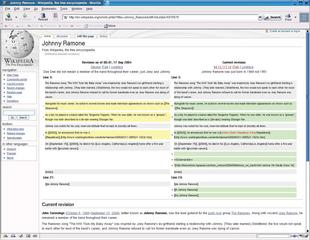The Wikipedia Project
World of Knowledge
Torsten Kleinz
The Wikipedia ProjectWorld of KnowledgeTorsten Kleinz |

|
We cannot stop business from restricting the information it makes available; what we can do is provide an alternative. We need to launch a movement to develop a universal free encyclopedia," said Richard Stallman in 1999, in an essay on a free encyclopedia [1].
Jimmy Wales and Larry Sanger Florida talked about the design and launched the Nupedia project in the year 2000. The idea was to allow anyone to submit entries that would then go through a sophisticated editorial process. But the project failed with just a handfull of articles finding their way into the encyclopedia.
The turning point came when Jimmy Wales started to investigate Ward Cunningham's Wiki principle. Ward had developed a lean, archaic editorial system that allowed every user of a website to modify text on a page directly, and even to create new pages. He called the system Wiki-Wiki, that is "quick" or "quickly" in Hawaiian. At the beginning of 2001, Jimmy relaunched the project for free world knowledge, and the Wikipedia was born [2].
The Wikipedia has established the principle of freedom at several levels. The contents can be used freely - all entries are published under the free GFDL documentation license - and the project itself is free for anyone to take part in. You do not even have to log on to edit an entry directly via the web page or to join in with a discussion.
The Wiki is not only used to organize entries; it is also used to organize the project itself. The project portal has a big collection of information on the Wikipedia itself: HOWTOs on writing entries, quality drives, and current votes - even press releases are a community effort.
This said, the Wiki has a few disadvantages as a discussion group. Users simply add entries to web pages - the structure is typically hand made. In other words, it is up to the users themselves to structure their entries neatly or let chaos reign. The Wikipedia developers have implemented a few functions to facilitate discussions. For example, you can sign your entries simply by clicking; you can also indent entries, and you can generate a table of contents based on the structure.
But pages tend to become cluttered in prolonged discussions. This has led to the project adopting other discussion media: IRC chat via Freenode and a number of mailing lists. It is becoming increasingly common for Wikipedians to meet directly, organizing workshops at congresses, such as the Wizards of OS in Berlin, Germany. There are even some local Wikipedia user groups.

As an open platform, Wikipedia relies on the majority of users supplying constructive entries. Instead of using the editorial process envisaged for Nupedia, Wikipedia relies on peer review. That is, users with equal status check and improve content. The Wikipedians are convinced that the more people work on an entry, the better the quality will become. Of course, if people have different opinions on a subject, there is nothing to stop them from indefinitely reinstating their own versions. As this is quite strenuous after a while. most people finally agree to compromise - at least in theory, although there are some exceptions.
The Wikipedia's open structure makes it a target for trolls and vandals who malevolently add incorrect information to articles, get other people tied up in endless discussions, and generally do everything to draw attention to themselves. Wikipedia is also a profitable platform for advertisers. A link on Wikipedia often pushes a website's Google ranking right up - and there are those who strive towards immortality with encyclopedia entries about themselves. Activists are another problem. One of the Wikipedia's most sacred principles is its neutral point of view - that is, the neutrality of its entries.

Administrators help keep Wikipedia on the right track. They can freeze controversial articles for a certain time and try to prevent petty disputes. But with over 400 new articles a day, and 300,000 entries being edited every month, it is not always easy to keep track. This means that normal users have to make a genuine effort to keep Wikipedia usable.
Version history provides a useful way of keeping track. Just a few mouse clicks allow anyone to find out who changed what and when. Users can compare two arbitrary versions directly, allowing them to see how an article has developed (see Figure 3). And this means that every user can become a moderator.
| Wikimedia Foundation |
|
For one year now, Wikipedia has been run by the Florida-based Wikimedia Foundation [3], which takes care of operations and financing for the project. The organization has raised over US$ 100,000 in donations so far. The money was mostly invested in new servers, which are working at full capacity to handle the masses of queries and modifications. New Wiki-based projects keep on appearing to accompany the encyclopedia project, such as dictionaries in various languages (Wiktionaries), Wikibooks with free online teaching resources, and Wikiquote for quotes. |
The decision making process within Wikipedia is not easy to comprehend. There are votes, although their outcome is not binding. Administrators are elected (and removed from office) by the more active users. Before an article is deleted, votes for and against are collected on a special page, and discussions precede any decisions.

It is not easy for newbies to come to terms with the rules and processes that have accumulated in the course of the last four years. More senior Wikipedians have adopted a policy of sending welcome messages to new users to make them feel at home.
These messages are addressed personally and refer directly to the first modifications the user has made. The more experienced users give newbies tips on how to improve their contributions and point the way to areas where work is most needed. The most common tip is to be bold. The long-term success of a project depends on people making active contributions rather than just consuming.
Wikipedia is outstanding with respect to quantity. In only seven months, the number of articles grew from about 500,000 to over a million. And this is why the focus has shifted to quality assurance; for example, the German Wikipedia site has introduced an "Excellent Articles" category.
But progress with implementing the new "Excellent Articles" concept is slow - to date only 300 of more than 175,000 German articles have been through the selection process. Writing contests, which were introduced by the Dutch Wikipedia and have now been adopted by the German site, are yet another approach to ensuring quality.
Wikipedia has overachieved in all respects thus far, but the future is still uncertain. In the Fall of 2004, the first CD version of the German Wikipedia was released; English and French versions are due to follow. Work is underway on a printed version in the USA. But there is no way of knowing where Wikipedia will be this time next year. Continual expansion of the community means continually adapting to new situations. Or as Jimmy Wales puts it: "We need to maintain and improve our quality standards, while at the same time remaining open, friendly, and welcoming as a community. This is a challenge."
| Mediawiki |
|
Although the free encyclopedia originally started life on an existing Wiki engine, it moved to its own Wiki software two years ago: Mediawiki [4], [5]. Mediawiki is a Wiki engine that was custom developed under the GPL to reflect the needs of the Wikipedia, but has now become a popular platform for other Wiki projects. The software is written in PHP and uses the MySQL database. |
| Info |
|
[1] Richard Stallman's plea for a free encyclopedia: http://www.gnu.org/encyclopedia/free-encyclopedia.html [2] Wikipedia site: http://www.wikipedia.org [3] Wikimedia foundation: http://wikimedia.org [4] Mediawiki software: http://wikipedia.sourceforge.net [5] Erik Möller: "Collective Authoring", Linux Magazine #42, p54 |